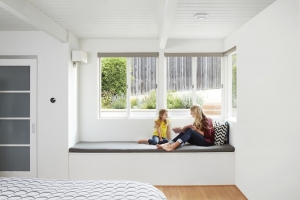 With social media on just about every device, parents have new fears to keep them awake at night. Around 95% of teens between the ages of 12 and 17 are online, and 81% of them use social media sites regularly, according to a recent study from the Pew Research institution. Younger children are also logging on, and with frequent use of social media come a host of concerns such as cyberbullying, online reputations and “Facebook depression.” Thankfully, parents have the power to help their kids create a safe and positive online experience.
With social media on just about every device, parents have new fears to keep them awake at night. Around 95% of teens between the ages of 12 and 17 are online, and 81% of them use social media sites regularly, according to a recent study from the Pew Research institution. Younger children are also logging on, and with frequent use of social media come a host of concerns such as cyberbullying, online reputations and “Facebook depression.” Thankfully, parents have the power to help their kids create a safe and positive online experience.
Getting started: Privacy and safety. Before allowing your kids to start their own profiles, talk to them about social media etiquette and the risks they could face online. A special lunch or an ice cream sundae date can make the discussion more causal and helpful rather than leading to an argument. Be sure to discuss:
Online reputation. Everything posted online remains there forever, whether it’s stored on website archives or company databases, and can affect college admission and even whether or not you get a job. Your kids need to make sure photos and posts are appropriate and not likely to come back to haunt them years later.
Identity protection. Avoid online questionnaires, contests and giveaways, since they’re generally designed for data mining. Even more importantly, kids shouldn’t post photos, status updates or profile descriptions with geotags, the active location settings or identifiable features that allow strangers to pinpoint their location. Ensure that privacy settings on their social media sites are up to date to prevent identity theft.
Stranger danger. Your kids probably will roll their eyes when you advise them not to accept friend requests from people they don’t know, but this is the safest option. Despite this warning, chances are, at some point, your kids will communicate with someone they’ve never met. They need to know what not to disclose. Be sure your kids understand that they should never give their full name or location to those they’ve connected with online and that they should never arrange face-to-face meetings.
Keep sites age-appropriate. Facebook was not designed for young kids, and to sign up, you have to be at least 13 years old. Don’t let younger kids lie about their birthdays to create accounts, especially with so many alternatives for those in elementary and middle school. A few to consider are Jabbersmack, Club Penguin, Yoursphere and Sweety High.
Kindness matters. Be sure your kids know not to post anything online that isn’t kind enough to say face to face. Posts in anonymous “honesty boxes” or on “bathroom walls” tend to encourage mean and inappropriate behavior, so it’s important to steer clear of them, along with aggressive online arguments and uncomfortable questions.
Keep things honest and open. When I was growing up, the computer was always in a central location: the living room or my dad’s office. The fact that my online activity could be seen by anyone passing by helped keep me honest. A central location is a great starting point, but remember that some kids may need more supervision than others.
Depending on your relationship with your kids, you may want to “friend” them on Facebook so you have access to their online posts or activities. If you go this route, though, be sure to show respect by not posting anything on their walls that would embarrass them.
When my cousin first joined Facebook, my aunt came up with a wonderful idea to monitor her activity in a more subtle way. As a condition of joining Facebook, my cousin had to “friend” me, her cool older cousin. I kept an eye on her, and if I saw something questionable, I let my aunt know.
Be aware that some kids create alternate social media accounts in secret to post everything you wouldn’t approve of. Watch for accounts with your child’s name spelled backward or with their middle name as a surname.
One of the best lessons to teach kids about social media is perspective. Limit screen time and offer real-life activities in sports, the arts and face-to-face visits with friends. When you add balance to the mix of education, communication and respect, your kids will be on track to maintain safe and fun social media connections. And, as my friends have discovered, if you take the time to talk to your kids about social media, it is one less thing for a parent to worry about.
By Alexandra Rice, NerdWallet.











Leave A Comment
You must be logged in to post a comment.